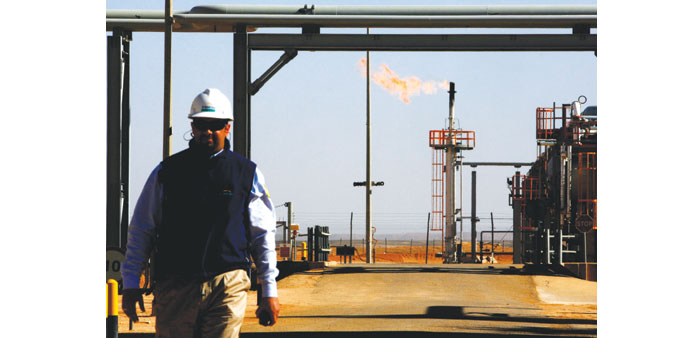An employee walks in front of a gas flare at the In Salah Gas (ISG) Krechba Project, run by Sonatrach, British Petroleum (BP), and StatoilHydro, in the Sahara desert near In Salah, Algeria (file). The North African state, a major gas supplier to Europe, has already said energy earnings will fall by 50% this year to about $34bn. Oil and gas sales make up 95% of its exports and account for 60% of the country’s budget.
Reuters
Algiers
Algeria’s energy earnings are forecast to fall to $26.4bn next year while foreign exchange reserves will dip to $121bn after low oil prices cut into the Opec nation’s economy, Finance Minister Abderrahmane Benkhalfa said yesterday.
The North African state, a major gas supplier to Europe, has already said energy earnings will fall by 50% this year to about $34bn. Oil and gas sales make up 95% of its exports and account for 60% of the country’s budget.
Algeria is considering higher taxes, import duties and a hike in subsidised diesel and electricity prices to help cover its deficit after the slump in crude oil prices eroded its revenues, according to a draft of its 2016 budget.
“We have to be vigilant in the management of our money. We have to control public spending,” the minister told the parliament where the draft budget law was presented. “We have to mobilise new resources. We have planned a reasonable increase in the prices of fuel and electricity to cover production costs,” he said.
Domestic prices for energy products are very low by international standards in Algeria, which analysts say is the main reason behind high consumption rates in the country of 40mn people.
The world oil price slide is testing an economic system that relies on energy revenues to pay for a vast range of social subsidies, from public housing to cheap loans and subsidised fuel, which helped Algeria avoid the kind of “Arab Spring” uprisings that erupted in its North African neighbours.
Benkhalfa said overall spending on subsidies will rise 7.5% next year. That includes mainly food, transport, housing and public health coverage.
Algeria is also trying to draw more foreign investment to help increase oil and gas production, which has remained largely stagnant in the past three years.
Algeria posted a trade deficit of $10.825bn in the first 10 months of 2015 against a $4.29bn surplus a year earlier, after a 40.7% drop in energy earnings, customs data showed on Sunday.
The finance minister said foreign exchange reserves will drop to $151bn by the end of this year before reaching $121bn in December 2016. That represents the equivalent of 23 months of imports, he said.
Reserves were $159bn in June 2015, down from $193bn in the same month in 2014. The law is widely expected to be approved by the parliament, but some lawmakers have criticised the government’s plans to increase the prices of some subsidised fuels.
“This is a dangerous law. The government wants its citizens to pay for deficits from their own pockets,” said Lakhdar Benkhellaf, a deputy for the opposition Islamist party Justice and Development Front. “The price increases will push inflation up.”

